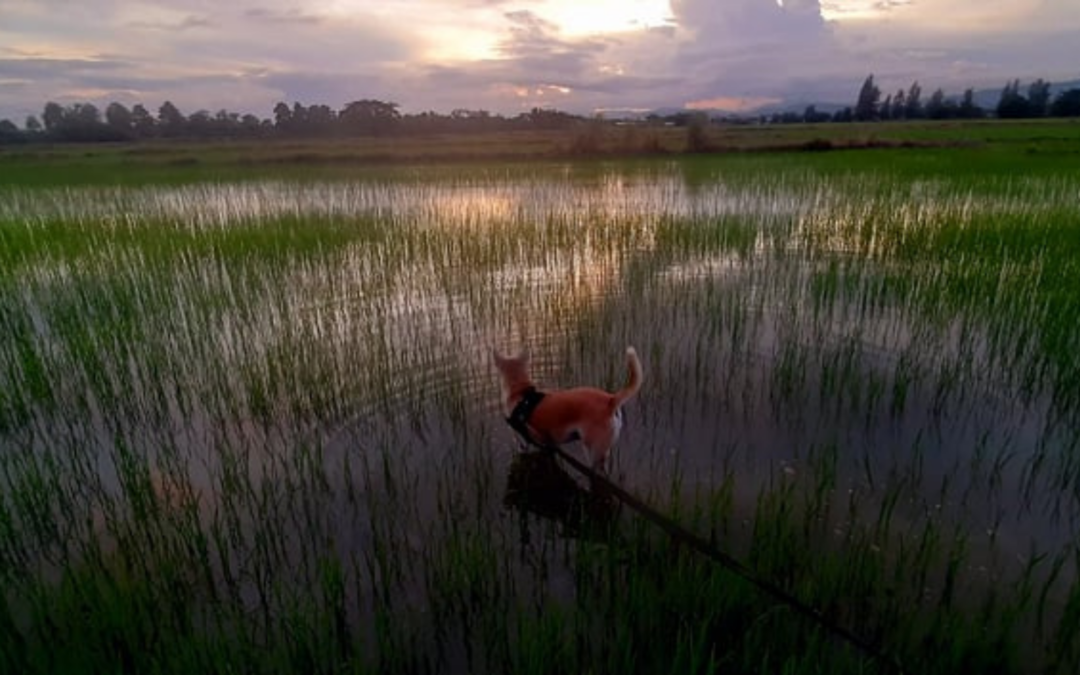With cooler temperatures coming on and colors to behold, it’s the perfect time to get outside and enjoy nature -with your dog!. Not only is a great bonding experience, it’s also healthy for you and your best friend. We all need a bit of a release, let the air out of the bubble, so to speak. Why not hit the trail with your pupper…breathe in and decompress. Whether it’s a gentle walk with your senior dog, or a more challenging hike, take this time to grow your relationship, that benefits you both, physically and mentally = a win win – or a bow wow!
Where Jackie Chan and I live in Northern Thailand, it’s rainy season. I love this very green time of year and JC has been quite intrigued, wading in the rice fields behind our home, and I, with the magnificent sunsets. It’s amazing – thanks Thailand!

No matter the region you’re ready to explore, there are some simple tips to follow to keep your pet safe.
- Keep your dog leashed unless in a familiar area where you are confident they’ll be safe. You don’t want them running off and getting lost or injured. Consider a reflective collar in this regard.
- Make sure your dog is wearing a pet ID in case he or she does get lost. If your pet is microchipped, that could be of benefit as well in the case your pet goes missing.
- Take a small first aid kit. Having emergency essentials will help if needed, these should include: betadine, antibiotic ointment, saline, gauze pads, adhesive tape, swabs, scissors, tweezers.
- Bring poo bags. Picking up after your pet is responsible and considerate,.
- Always carry a portable bowl and water. Keep your pet hydrated and avoid the heat of the day by going early mornings or evenings. Be watchful of overheating.
- Have treats on hand. As we ourselves get hungry on the trail, so do our pets.
- Be aware of toxic things your dog may want to consume. There are mushrooms and fungi that can be dangerous to your pet, among other things they may want to sample, like fallen fruit that could be moldy. Some of the warning signs that your dog has been poisoned include: Blood in the vomit, Seizures, Weakness, Rapid breathing. Seek emergency medical help immediately. Always have your vet’s contact information on hand.
- Take care if you encounter any wildlife. It’s best your pet have its rabies up to date, just in case. Don’t let them root around too much as there could be creatures in hibernation nearby.
- Make sure to take things slowly, especially with seniors. Let them build up momentum before taking them on longer or more difficult walks. Beware of any arthritis and how to give pain medication afterwards, if needed.
- Check your dog for ticks after each walk, and their pads for anything that may be stuck inside.
- Contact your vet if you see your dog experiencing any adverse reactions once getting home. Better safe than sorry!

Take it in and appreciate all the outdoors has to offer! We find ourselves more deeply by being one with nature. You can only imagine how our canines, the wolves close relatives, feel about it – pawsitively delighted to be out in the open air, where they can use their noses to their fullest!
On a side note: the consensus is that the domestic dog evolved from the ancestor of the gray wolf and domestication first took place about 10,000 years ago.
Watch this space for more on that…


Recent Comments